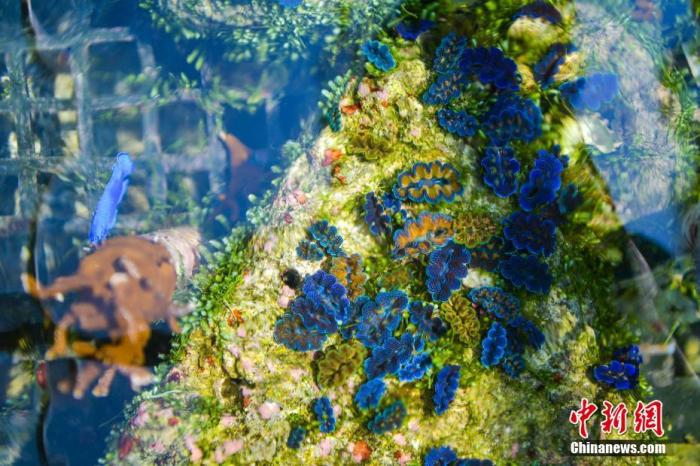China News Agency, Wanning, Hainan, May 2 Telegram: Visiting Hainan Land "Ocean Ranch"
China News Agency reporter Zhang Qianyi
In Paixi Village, Shangen Town, Wanning City, Hainan, there is a land-based "ocean pasture"-a land-based coral and clam breeding base. The artificially cultivated corals, giant clams, seaweeds, and fish form a small ecosystem, and through the food chain multiple filter foods, zero pollutant emissions and zero breeding medicines are achieved. The grown corals and clams are released into the sea and used to restore the marine ecological environment.
Data map: Land-based corals and artificially cultivated giant clams in the pools of the giant clam cultivation base. China News Service reporter Luo Yunfei
The reporter recently visited this land "ocean ranch" covering an area of 1,000 square meters.
Seven years ago, when aquarium lovers Wang Yuan traveled from Beijing to Hainan, the cultivation of corals and clams was still blank. After exploration, Wang Yuan and his team simulated the coral reef ecology of the sea on land, and selected high value-added varieties to match. Today, the land-based "Ocean Ranch" has begun to take shape, and Wang Yuan's team has made breakthroughs in the breeding technology of hundreds of coral and marine fish.
The reporter saw at the scene that the ranch has a nursery area and a breeding area, and the entire system is connected by flowing seawater. Transparent glass water tanks are lined up, and sunlight shines into the water through the glass roof. Various colors of tropical fish, corals, clams, seaweeds and other marine life plants present a colorful scene.
"These water tanks form a closed, circulating water environment in a modular form." Wang Yuan used the circular water ecological aquaculture technology he invented in pastures, building a multi-level ecosystem through fish, coral, seaweed and microorganisms, and Maintain a clean water environment with "high biomass and low nutrients".
There are nearly 60 kinds of corals in this closed "small world". Most of the corals in the water tank grow on a movable base. The whole coral can be taken out by pulling out the base. Wang Yuan said that this is a technological innovation for large-scale release of coral in the future. The grown coral can be transplanted to the artificial reef of the sea through the whole plant on the base, which has higher stability and higher survival rate.
Zhou Hailong, a professor at the State Key Laboratory of Utilization of Marine Resources in the South China Sea (Hainan University), said: "Coral reefs are one of the most important components of the marine ecosystem and are equivalent to the homes of other marine life. On the bottom of the sea, the coral reefs are completely degraded Desert. In recent years, due to global warming, ocean acidification, environmental pollution, overfishing and other reasons, the coral reef ecosystem has deteriorated very seriously, and the status quo is not optimistic. "
Wang Yuan said that their land “ocean pastures” rely on sunlight as the driving force, and seaweed is a primary producer that provides food for fish. The feces produced by fish become "nutrients" for corals and giant clams; corals, giant clams and seaweeds are responsible for purifying water quality and creating a high-quality growth environment for fish.
The base has now bred more than 200,000 corals and more than 100 species, and cooperates with the South China Sea Institute of Oceanology, Chinese Academy of Sciences to carry out artificial breeding of coral and clam research projects. In April of this year, under an artificially controlled environment, Wang Yuan and his team successfully bred a large number of coral larvae through sexual reproduction to realize the ovulation and ovulation of staghorn coral reef-forming corals in an artificial circulating water environment isolated from the outside world. .
"Sexual reproduction will be of great significance for low-cost, large-scale restoration of marine coral reefs." Zhou Hailong recently came to the base to collect coral eggs. He said that most of the current coral reef repairs adopt artificial transplantation, which is not only costly, but also the wild environment is not Stable, it is difficult to meet the needs of large-scale coral reef restoration. Under the artificially controlled indoor conditions, the sexual reproduction of coral can quickly obtain a large number of coral seedlings. After cultivation, the cultivated coral can be transplanted to the coral that needs to be repaired and suitable for coral without affecting the original coral reef ecosystem. Growing habitat.
The benefits of an environmentally friendly "ocean pasture" are expected. For example, Wang Yuan said that a standard land-based coral reef ecological marine pasture covers an area of about 10 acres, and it can generate economic benefits of at least 4 million yuan a year. In the future, it can also develop tertiary industries such as snorkeling and popular science tourism.
Shangen Town, Wanning City is planning to cooperate with Wang Yuan to build a demonstration base for seawater eco-cycle breeding. The relevant person in charge of the town said that marine aquaculture is one of the main local industries, and the new land "ocean pasture" model has broadened new ideas for the town's "farming + tourism" integration and industrial upgrading. (Finish)

